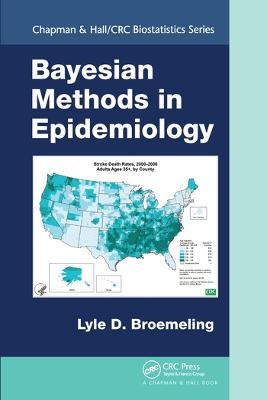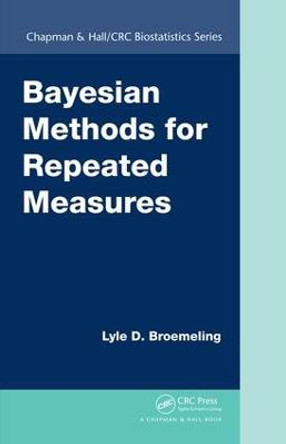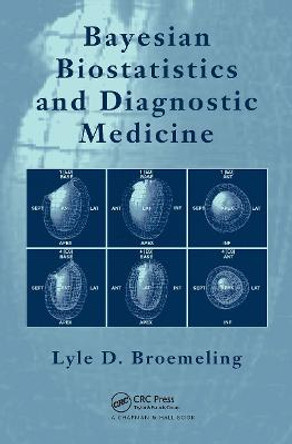Description
Written by a biostatistics expert with over 20 years of experience in the field, Bayesian Methods in Epidemiology presents statistical methods used in epidemiology from a Bayesian viewpoint. It employs the software package WinBUGS to carry out the analyses and offers the code in the text and for download online.
The book examines study designs that investigate the association between exposure to risk factors and the occurrence of disease. It covers introductory adjustment techniques to compare mortality between states and regression methods to study the association between various risk factors and disease, including logistic regression, simple and multiple linear regression, categorical/ordinal regression, and nonlinear models. The text also introduces a Bayesian approach for the estimation of survival by life tables and illustrates other approaches to estimate survival, including a parametric model based on the Weibull distribution and the Cox proportional hazards (nonparametric) model. Using Bayesian methods to estimate the lead time of the modality, the author explains how to screen for a disease among individuals that do not exhibit any symptoms of the disease.
With many examples and end-of-chapter exercises, this book is the first to introduce epidemiology from a Bayesian perspective. It shows epidemiologists how these Bayesian models and techniques are useful in studying the association between disease and exposure to risk factors.
Reviews
"... the only book that I am aware of in literature that introduces epidemiology from a Bayesian point of view. ... Each concept has been introduced in its standard definition as well as its analogy in the Bayesian approach, thereby making it easier for non-Bayesian researchers to understand. The book is very well written and structured in a way that makes the comprehension of the introduced concepts very smooth. The comprehensive range of covered topics is impressive but not daunting. ... a great textbook for any researcher with considerable statistical background who is interested in applying Bayesian methods to public health data. ... useful as a refresher course ... I would highly recommend Bayesian Methods in Epidemiology as an introductory text to the subject as a whole. ... also a valuable resource for experienced Bayesian analysts."
-Statistics in Medicine, 34, 2015
"This is a useful and interesting book ... This book will help initiate those unfamiliar with Bayesian principles in Bayesian thinking and further implement Bayesian methodology in solving problems of import in medical applications. ... an exciting book, which I believe has the potential to help public health practitioners identify important risk factors for disease and make important policy decisions."
-International Statistical Review, 82, 2014
"This book consists of some examples of Bayesian methods applications to the analysis of epidemiological statistical data. It covers analysis of associations between risk exposures and diseases; adjustment of mortality data; regression methods; life tables analysis; survival analysis with Bayesian Kaplan-Meyer methods and Cox proportional hazards models; and screening for diseases."
-R.E. Maiboroda, Zentralblatt MATH
"...by reading the book and working through the author's examples, and the examples at the end of each chapter, analysts working in epidemiology are supposed to gain an understanding of how Bayesian methods might be applied to their own work."
-The American Statistician
"In Bayesian Methods in Epidemiology, Dr. Broemeling brings his vast working expe-rience in the field to a practitioner's guide for epidemiologic principles solved the Bayesian way. Illustrations with real data from important studies, a host of exercises, politely sub-tle references to appendices for review, and an abundance of WinBUGS code make this book highly accessible to scientists working across the quantitative spectrum."
-Biometrics
"... the only book that I am aware of in literature that introduces epidemiology from a Bayesian point of view. ... Each concept has been introduced in its standard definition as well as its analogy in the Bayesian approach, thereby making it easier for non-Bayesian researchers to understand. The book is very well written and structured in a way that makes the comprehension of the introduced concepts very smooth. The comprehensive range of covered topics is impressive but not daunting. ... a great textbook for any researcher with considerable statistical background who is interested in applying Bayesian methods to public health data. ... useful as a refresher course ... I would highly recommend Bayesian Methods in Epidemiology as an introductory text to the subject as a whole. ... also a valuable resource for experienced Bayesian analysts."
-Statistics in Medicine, 34, 2015
"This is a useful and interesting book ... This book will help initiate those unfamiliar with Bayesian principles in Bayesian thinking and further implement Bayesian methodology in solving problems of import in medical applications. ... an exciting book, which I believe has the potential to help public health practitioners identify important risk factors for disease and make important policy decisions."
-International Statistical Review, 82, 2014
"This book consists of some examples of Bayesian methods applications to the analysis of epidemiological statistical data. It covers analysis of associations between risk exposures and diseases; adjustment of mortality data; regression methods; life tables analysis; survival analysis with Bayesian Kaplan-Meyer methods and Cox proportional hazards models; and screening for diseases."
-R.E. Maiboroda, Zentralblatt MATH
"...by reading the book and working through the author's examples, and the examples at the end of each chapter, analysts working in epidemiology are supposed to gain an understanding of how Bayesian methods might be applied to their own work."
-The American Statistician
"In Bayesian Methods in Epidemiology, Dr. Broemeling brings his vast working expe-rience in the field to a practitioner's guide for epidemiologic principles solved the Bayesian way. Illustrations with real data from important studies, a host of exercises, politely sub-tle references to appendices for review, and an abundance of WinBUGS code make this book highly accessible to scientists working across the quantitative spectrum."
-Biometrics
Book Information
ISBN 9780367576349
Author Lyle D. Broemeling
Format Paperback
Page Count 464
Imprint Chapman & Hall/CRC
Publisher Taylor & Francis Ltd
Weight(grams) 453g







